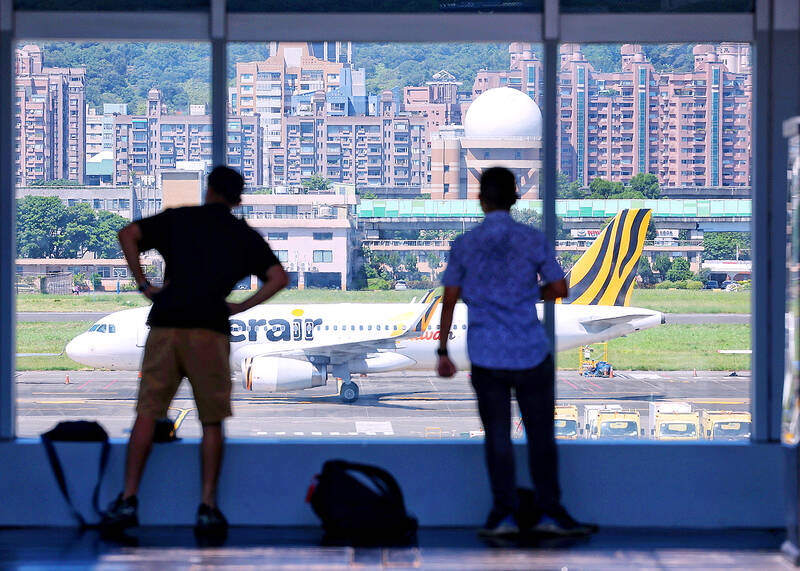The Cabinet yesterday approved a plan to next month reopen Taiwan’s borders to all visitors and lift the quarantine mandate for arrivals, provided the nation’s COVID-19 situation does not escalate.
The changes are likely to take effect on Oct. 13 as part of a phased easing of border controls that is to start on Thursday next week when a negative polymerase chain reaction test result would no longer be needed, Cabinet spokesman Lo Ping-cheng (羅秉成) told a news conference.
Arriving travelers would instead be given four rapid antigen home test kits, Lo said.

Photo: CNA
The three-day quarantine requirement followed by four days of mandatory self-health monitoring would be in effect until Oct. 13, he said.
However, the rule would on Thursday next week be relaxed slightly, with arrivals being allowed to quarantine in a residence occupied by others as long as they have a room of their own with a bathroom attached, Lo said.
If the COVID-19 situation does not worsen, mandatory quarantines would be scrapped on Oct. 13, and travelers would instead be asked to monitor their health for seven days after arrival, he said.
The weekly cap on arrivals would be raised to 150,000, Lo said, adding that this would include tour groups.
Tourists from countries with which Taiwan has no mutual visa-waiver program would no longer be excluded, he added.
Deputy Minister of Health and Welfare Victor Wang (王必勝), who heads the Central Epidemic Command Center, said if the number of daily COVID-19 cases starts rising again, the quarantine requirement might be retained.
In a radio interview earlier yesterday, Wang said the mask mandate might gradually be lifted for outdoor spaces and select indoor spaces, but would remain in potentially crowded places such as on public transportation.
Travel Quality Assurance Association spokesman Ringo Lee (李奇嶽) said the tourism industry welcomes the announcements, but the government should implement measures to ensure a smooth transition to the new policy.
“The government should raise the weekly cap on arrivals, allow airlines to raise the number of international flights to Taiwan and lift the ban for travel agencies to organize package tours. These supporting measures would give travel agencies more flexibility when they arrange inbound or outbound tours,” Lee said.
The government should also step up tourism marketing targeting foreign travelers, he added.
Taiwan should offer travel insurance similar to that offered in Japan, covering tourists’ expenses should they contract COVID-19 during inbound or outbound trips, Lee said.
Phoenix Tours general manager Benjamin Pien (卞傑民) said the inbound and outbound tour markets would probably recover to 50 to 60 percent of pre-pandemic levels in the fourth quarter of this year.
It would take another six months to a year for the markets to fully recover, he added.
Additional reporting by Shelley Shan

SECURITY: As China is ‘reshaping’ Hong Kong’s population, Taiwan must raise the eligibility threshold for applications from Hong Kongers, Chiu Chui-cheng said When Hong Kong and Macau citizens apply for residency in Taiwan, it would be under a new category that includes a “national security observation period,” Mainland Affairs Council (MAC) Minister Chiu Chui-cheng (邱垂正) said yesterday. President William Lai (賴清德) on March 13 announced 17 strategies to counter China’s aggression toward Taiwan, including incorporating national security considerations into the review process for residency applications from Hong Kong and Macau citizens. The situation in Hong Kong is constantly changing, Chiu said to media yesterday on the sidelines of the Taipei Technology Run hosted by the Taipei Neihu Technology Park Development Association. With

CARROT AND STICK: While unrelenting in its military threats, China attracted nearly 40,000 Taiwanese to over 400 business events last year Nearly 40,000 Taiwanese last year joined industry events in China, such as conferences and trade fairs, supported by the Chinese government, a study showed yesterday, as Beijing ramps up a charm offensive toward Taipei alongside military pressure. China has long taken a carrot-and-stick approach to Taiwan, threatening it with the prospect of military action while reaching out to those it believes are amenable to Beijing’s point of view. Taiwanese security officials are wary of what they see as Beijing’s influence campaigns to sway public opinion after Taipei and Beijing gradually resumed travel links halted by the COVID-19 pandemic, but the scale of

A US Marine Corps regiment equipped with Naval Strike Missiles (NSM) is set to participate in the upcoming Balikatan 25 exercise in the Luzon Strait, marking the system’s first-ever deployment in the Philippines. US and Philippine officials have separately confirmed that the Navy Marine Expeditionary Ship Interdiction System (NMESIS) — the mobile launch platform for the Naval Strike Missile — would take part in the joint exercise. The missiles are being deployed to “a strategic first island chain chokepoint” in the waters between Taiwan proper and the Philippines, US-based Naval News reported. “The Luzon Strait and Bashi Channel represent a critical access

Pope Francis is be laid to rest on Saturday after lying in state for three days in St Peter’s Basilica, where the faithful are expected to flock to pay their respects to history’s first Latin American pontiff. The cardinals met yesterday in the Vatican’s synod hall to chart the next steps before a conclave begins to choose Francis’ successor, as condolences poured in from around the world. According to current norms, the conclave must begin between May 5 and 10. The cardinals set the funeral for Saturday at 10am in St Peter’s Square, to be celebrated by the dean of the College